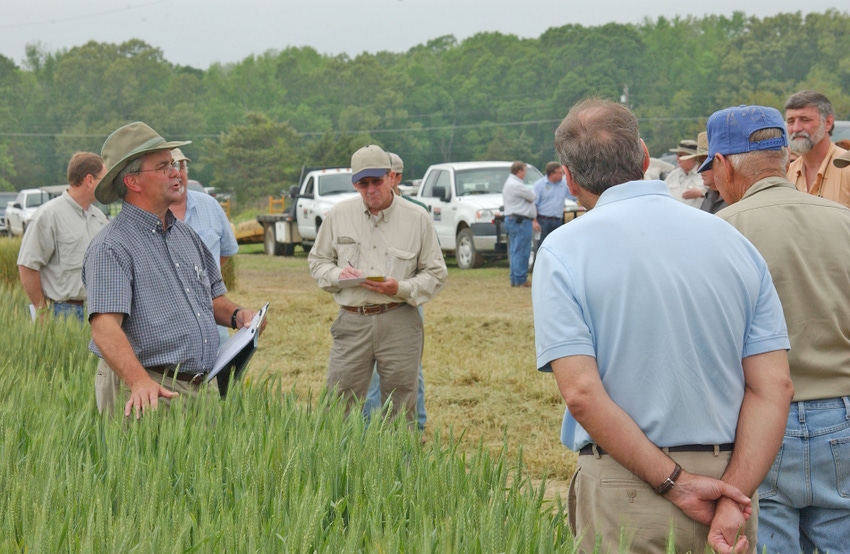June 14, 2013

The LSU AgCenter’s wheat breeding program has begun using molecular markers — small fragments of DNA — to help with disease and herbicide resistance.
One project seeks to develop molecular markers for resistance to the wheat disease called stripe rust.
Steve Harrison, the LSU AgCenter’s wheat breeder, said the wheat variety LA841 appears to have a unique combination of genes that has been stable in maintaining resistance to stripe rust for about 12 years.
Wheat disease management
Harrison is working with graduate student Alejandro Castro and molecular biologist Niranjan Baisakh to identify useful markers that have a high correlation to field resistance.
He developed a population by crossing a highly susceptible wheat variety with LA841.
“We derived 200 progeny from that cross and tested those progeny under heavy stripe rust pressure,” Harrison said.
The wheat was tested in three locations — Winnsboro, La., Plains, Ga., and Fayetteville, Ark. Harrison said testing in multiple locations means the wheat was likely exposed to different strains of stripe rust, which provides good disease ratings on the population.
The next step was to chop the DNA into many small segments to determine which pieces occur only in progeny that are resistant.
“From that we can develop a molecular marker that in the future can screen lots of lines for presence of the resistance genes, without having to have to do time-consuming field testing across several environments,” he said.
Sencor tolerance
Baisakh’s lab is also using molecular markers to map tolerance to the widely used herbicide Sencor. Some varieties of wheat are susceptible to the herbicide and can be killed along with the weeds.
“Growers like to use Sencor soon after planting,” Harrison said. “It is effective and inexpensive and gives broad spectrum wheat control.”
In this project Harrison crossed two varieties — one resistant to Sencor and one highly sensitive to it. He developed about 200 progeny and screened them over several field locations. Harrison said the wheat was sprayed with a high rate of Sencor — around twice the normal rate.
The researcher and his graduate student took notes on which lines showed tolerance and which were damaged.
“Now we will go and do molecular work to find a segment of DNA that contains the gene that gives you tolerance to Sencor,” he said.
Weed scientists have done screening for Sencor tolerance, but Harrison said it involves a lot of resources to screen many varieties in several environments over several rates of Sencor and is usually only done every few years.
“We have new varieties every year. But with molecular markers, you could tell in a week whether a new variety contains the gene for tolerance to Sencor,” Harrison said.
Two new varieties
The LSU AgCenter released two new varieties last year — Terral LA754 and ASG240. Harrison said both varieties appear to be performing well this spring and should be commercially available in limited quantities this fall and in larger amounts next year.
The breeding program has another potential variety, LA3200. Harrison said it has excellent stripe rust resistance, excellent leaf rust resistance, Hessian fly resistance, good yield and good test weight.
“I think it will be a very good variety. But because of seed production issues, we’re going to have to postpone releasing it until the following summer,” he said.
Ag news delivered daily to your inbox: Subscribe to Delta Farm Press Daily.
Cold and wet weather this past winter and spring damaged some of the seed increases and prevented others from being planted. Harrison said he lost a lot of breeding material in Winnsboro after a late-season freeze sterilized wheat plants that had started to flower in late March.
The Louisiana Soybean and Grain Research and Promotion Board helps fund these research projects.
You might also read:
Keith Morton - always looking for ways to do things better
Kevin Simpson: We just quietly do our own thing
You May Also Like




